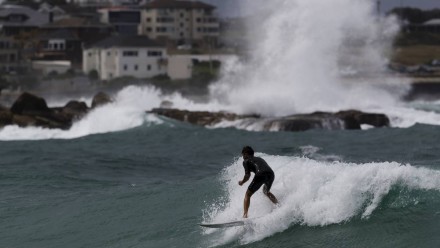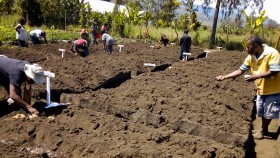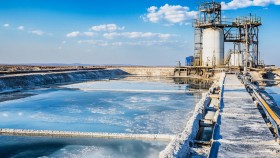Girt by sea, Australia faces serious climate challenge
Australia depends on the ocean that surrounds us for our health and prosperity. But that ocean is suffering from the effects of climate change that are playing out here and all over our planet.
Climate change alters our ocean and ice in a multitude of ways. Its impacts are now being seen everywhere - from the peaks of our high mountains to the depths of the ocean. The seas surrounding our continent are heating up, losing oxygen and becoming more acidic. Marine heatwaves have doubled since the early 1980s. Ice is shrinking everywhere, from the polar ice sheets, to mountain glaciers and snow, to sea ice and permafrost. Our seas are rising, fuelled primarily by these melting ice sheets and glaciers.
These changes are particularly alarming because the ocean and frozen regions play a vital role in supporting life on Earth, providing us with food, water and income. So far, the ocean has protected us from global warming - it is currently absorbing over 90 per cent of the excess heat in the climate system and about 25 per cent of our carbon dioxide emissions. But that protection has taken its toll on the health of our ocean and there is a limit to how far we can push the services that the ocean and frozen regions provide.
The latest Intergovernmental Panel on Climate Change report paints a picture of two radically different futures. On the one hand, if we allow climate change to continue at the current rate, Earth's ocean and ice will respond in increasingly dangerous ways that threaten our way of life. On the other hand, if we act quickly to drastically reduce our greenhouse gas emissions, then we can reduce the risks to people, our food, economy and ecosystems.
By 2050, more than one billion people will live on coastal land less than 10 metres above sea level, and will be exposed to combinations of sea level rise, extreme winds, waves, storm surges and flooding. In Australia, our coastal communities can expect to experience what was previously a once-in-a-century extreme coastal flooding event at least once every year by the middle of this century - in many cases much more frequently. But by drastically reducing greenhouse gas emissions, we could buy ourselves a decade to prepare for these damaging events - or even avoid them.
The ecosystems and fisheries around our coasts are also under pressure. Marine heatwaves are already damaging coral reefs, kelp forests and aquaculture. These heatwaves are expected to become between 4-10 times more common this century. Overall, our fisheries' potential is expected to decline by more than 20% over this period.
So how can we respond?
As a society, we have choices to make now. The good news is that if we decide to urgently and significantly reduce our emissions as part of a concerted global response, we can avoid the worst-case scenarios outlined in the report. The more decisively we act, the more we will be able to slow the speed and magnitude of future changes including to our ocean and ice. All of us can be part of achieving this, from our highest political representatives to individuals, households, local communities and businesses. But individual action is not enough - to limit climate change, we also need to transform the systems and policies that drive individual behaviour.
But even if we act now, some changes are already locked in and our ocean and frozen regions will continue to change for decades to centuries to come. So, we need to also make plans to adapt. In Australia, adapting coastal communities to unavoidable sea level rise is a priority. There are various adaptation options, from building barriers to planned retreat, to protecting coral reefs and mangroves that provide natural coastal defences. This IPCC report can help us evaluate the pros and cons of different strategies.
In fact, many of its findings are consistent with other recent IPCC reports. We can respond to climate change in ways that generate win-wins for everyone, where climate adaptation can reduce emissions and at the same times benefit communities, our economy and our environment. But this requires informed, ethical, timely and strategic decision making. We are not in this space yet.
The report serves as a wake-up call to the world about the devastating consequences of failing to act to address climate change. We have no time to lose.
- Associate Professor Nerilie Abram, a climate change scientist from the Australian National University, is a co-ordinating lead author of the IPCC Special Report on the Ocean and Cryosphere in a Changing Climate.
- Professor Mark Howden is director of the Climate Change Institute at the Australian National University and Vice Chair of Intergovernmental Panel on Climate Change Working Group 2.











